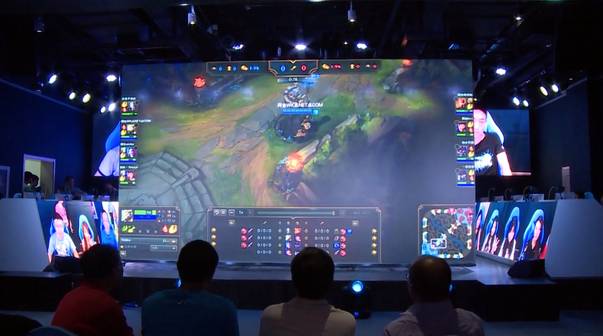The Las Vegas Strip may eventually be home to an arena for competitive video games if one Chinese company gets its way.
Beijing-based Ourgame International Holdings Ltd., the parent company of the World Poker Tour, wants to build multiple arenas for competitive video games, or e-sports, around the globe — and it sees Las Vegas as a prime location. Ourgame already runs such an arena in Beijing, and officials said this week that the company was teaming up with a group of other Chinese businesses to expand to other countries.
Frank Ng, Ourgame’s chief executive, said in an interview that he would like to see at least a dozen e-sports arenas worldwide within the next three to five years. If one came to the Strip, it would probably function similar to the company’s Beijing version, a 14,000-square foot complex comprising a 200-seat arena, a broadcast studio, hundreds of gaming stations and more.
E-sports has already seen massive success in the United States. Tournaments and championships for the games "Dota 2” and "League of Legends” have drawn throngs of fans to the KeyArena in Seattle, the Staples Center in Los Angeles and Madison Square Garden in New York.
The idea behind a Las Vegas e-sports arena, however, isn’t to host huge events like that. Rather, the Strip venue would be a space for smaller, much more frequent events that could be connected to arenas in other locations.
Adam Pliska, World Poker Tour’s president, said Ourgame aimed to do for e-sports what his tournament series helped do for poker: build an internationally connected set of competitions, essentially. But while it took the World Poker Tour years to spread its wings globally, Ourgame already had established an international presence, Pliska said.
“They’re able to get people together and really commit to a global enterprise for e-sports right from the beginning,” he said.
If the Strip e-sports arena would move forward, Ng said it would require establishing some sort of local partnership, perhaps with a television network. Ng and Pliska have talked to some possible partners but haven’t agreed to anything concrete yet.
Also unclear is exactly where the arena would be built. Pliska said they had only had “very preliminary talks” but noted that a few casino operators had already expressed interest in e-sports. Ideally, the venue will be located at a resort, Ng said — that way, backers won’t have to build it from scratch.
Ng said he’d like to see the arena completed sometime next year.
It would not be Las Vegas’ first foray into the world of e-sports. The Evolution Championship Series, a fighting game competition, has been held in Las Vegas for years, and the 2016 iteration will host finals at the 12,000-seat Mandalay Bay Events Center, according to ESPN.
Additionally, the Downtown Grand hotel-casino has created a lounge for e-sports and also hosted an e-sports team, the L.A. Renegades, for a residency last year. Chairman Seth Schorr said in an interview this month that the lounge space had helped attract new customers to his property, and that some were even spotted at the blackjack tables.
Ourgame’s arena idea is not without precedent elsewhere in the United States, either: A similar venue, eSports Arena, opened in Orange County, Calif. in October. The 15,000-square foot facility boasts a capacity of 1,000 people for large events, 120 PCs, 64 Xboxes and 32 PlayStation 4’s, according to CEO Paul Ward.
Ward said his company would like to expand its e-sports arena concept to various locations across North America.
“It’s important to capture multiple markets for these events, for these experiences, and to create a regional affinity that doesn’t really exist in e-sports that drives so much enthusiasm in traditional sports,” he said. “If we can really grow the idea of a Southern California team playing against the Vegas team, or the Bay Area team — that’s a powerful and valuable idea.”
But why would anyone come to the Strip to play video games — or watch others play them — given all the other entertainment options Las Vegas has to offer?
Chris Grove, an online gambling expert who has also studied e-sports, said the answer was not unlike what motivates people to watch football in nosebleed seats with tens of thousands of other like-minded fans, rather than viewing it in hi-definition at home. It can be an engaging, exciting experience that brings together people with similar interests, he said.
“The parallels just up and down the line between this and any other commercial professional sport in the U.S. are really striking,” Grove said.
And there’s good reason to believe that video games can draw just as much interest as more traditional sports. According to a 2015 report co-authored by Grove, e-sports was expected to be a $523 million industry in 2015, excluding revenue from game sales. The report also anticipated that e-sports would attract a little less than 200 million unique global viewers.
And considering the popularity of the underlying product — video games themselves — Grove said e-sports likely represented not a fad, but an evolution in consumer interests that’s here to stay.

